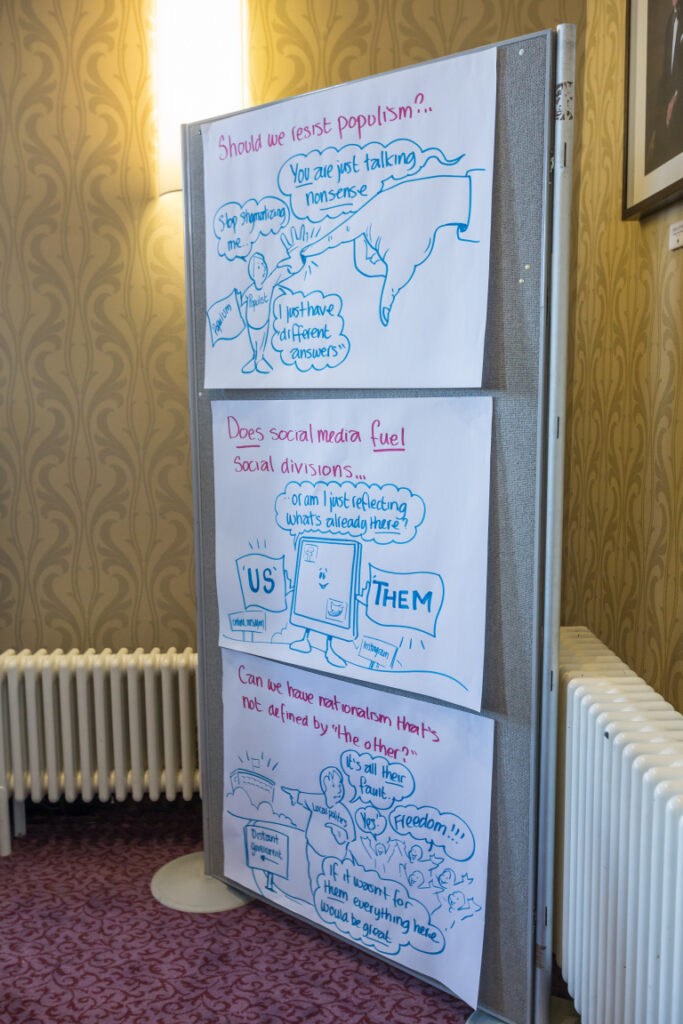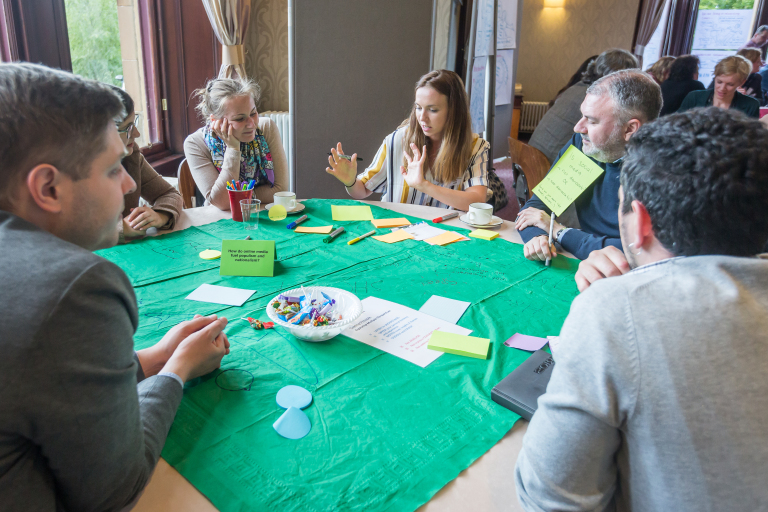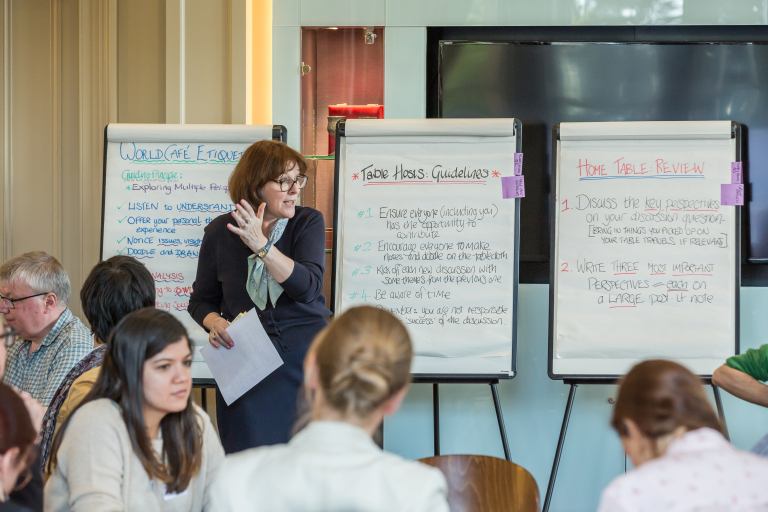
On June 21st, 2018, Edinburgh Napier University Lecturer and Researcher, Dr Michael Kranert, lead a special public dialogue event on the topics of populism and nationalism. Following the World Café method, the event aimed to open dialogue, fostering collaborative learning and collective insight.
“There’s no expert – everyone’s experience and opinions matter. Imagine a lively gathering, full of interesting conversations, and plenty of food for thought!”
In the following case study, Dr Kranert has presented the details of the event – including critical insights, and recommendations for the improvement and enhancement of this type of event.
Populism & Nationalism World Café: Public Dialogue Event
The World Café took place on the afternoon of the first day of an academic conference, ‘New discourses on populism and nationalism’, hosted by the Languages group at the university on 21 and 22 June 2018. Through posters in public locations, online media engagement and individual invitations sent to NGOs and groups interested in politics, an interested public was invited to an afternoon of exchanging ideas with international researchers working on populism and nationalism.
The World Café is a method for facilitating collaborative and active dialogue even in large groups. Set questions are discussed in small groups which encourages everyone’s contribution. Towards the end of the session, experiences and insights a shared with the whole group.
The openness of the conversation allows academics and non-academics to share insights into a problem – in this case the intertwining between nationalist and populist discourses. Four questions were asked:
(1) How do online media fuel populism and nationalism?
(2) What would ‘good’ nationalism look like?
(3) How is language used to create nationalist and populist politics?
(4) Should we resist populism.
The visual facilitator Graham Ogilvie created cartoons while the World Café took place. This not only serves the purpose of documenting the event on the blog, but also gave participants the opportunity to see ideas come to life in a visual form and encouraged them to feel that their contributions have equal value.


The World Café methodology was combined with a multimedia campaign: Academics and non-academics were asked to produce short text introducing their thoughts on the topic in a clear and accessible manner. The text-based contributions were published on the event blog and distributed via Twitter.
The blog allowed for engagement with a broader public beyond the participants, facilitating their participation in academics and practitioner’s knowledge, as well as the methodology of knowledge exchange. It also formed the basis of the documentation of process and results, together with the cartoons and photographs of the event.




Why did you choose these methods of engagement?
The discussion at the world café was designed to allow both academics and non-academics to listen to each other’s experiences and build a network for future knowledge exchange.
World-cafes as mechanisms of public engagement have been underused in academic conferences. The standard public engagement element is a panel discussion, leading to a very limited and often one-way engagement with academic work. This world café aimed to have an open, inclusive approach, acknowledging that knowledge and expertise does not lie solely in the academy.
What went well?
The world café was a great success in both numbers and quality of the debate. Out of 68 conference delegates 52 participated. We managed to have 12 bookings from general public, however, only 8 of those took part.
The world café proved to be a good method to allow a free and lively debate: All participants were engaged in the conversation and the mixing of the groups for the different questions allowed people to hear many different perspectives. The anonymous feedback survey shows that both academics and non-academics felt the relaxed and playful atmosphere facilitated conversations and allowed to listen to a variety of perspectives.
The visualizations produced by Graham Ogilvie provided another level of engagement with the ideas of participants, which became evident when participants were asked to vote for their favourite poster and had to give reasons.
A particular phenomenon was the change of the conversation within the academic conference itself – many presenters on the second day of the academic conference referred to the conversations in the world café. The world café proved to be an ideal conversation starter for the academic discussion as well!






What might you have done differently?
The main challenge proved to be the engagement of public participants. The event was announced online through a blog, through regular tweets and also through posters in key areas of the city. We achieved to have 12 bookings, however, only 8 took part.
For future events, a more targeted and sustained advertising campaign might improve figures, and it might also be better to organize the event later in the day.
Testimonials from the anonymous survey:
Q1) What are the two most important insights you took away from this event?
- Un-reflected critique of populism is as divisive as populism itself. National identity is the positive side of nationalism, and vice versa.
- Populism and Nationalism are more nuanced than realised, but remain problematic from a critical standpoint.
- It’s difficult to get members from the public to attend. It’s equally difficult to connect the abstract academic concept to lived reality.
- That academics can stop being academics and be real people. That the terms populism and nationalism are up for negotiation.
- Hearing from people from different perspectives than mine. Getting feedback on my own ideas.
Q2) What made the event a positive experience?
- It was colourful, playful and interactive.
- Very well facilitated and run – because of this, felt confident of proceedings and that good conversations would be had.
- Easy going communication, excellent organizational skills of the curator, willingness of participants
- The facilitator, was fantastic. She was funny and effective, which set the tone for the afternoon. Being able to draw on the table was good too.
- Exchange of ideas in a relaxed, informal and non-competitive environment.
Q3) How can we improve the event?
- More people from different backgrounds.
- To invite more people from public, to communicate the event through social media and groups of interests
- Making a much greater effort to get the public in.
- Possibly it was too long. Our first conversation group was certainly the most enjoyable. Whether it was from the heat or effort, people were flagging towards the end and the conversations got a bit repetitive. Perhaps one group change would have been enough. Obviously it would have been nice to get more non-conference people there too.
Further Information
Find out more about this World Café event on the official blog at popnat2018.wordpress.com, and on the event Twitter @PopNatConf.





